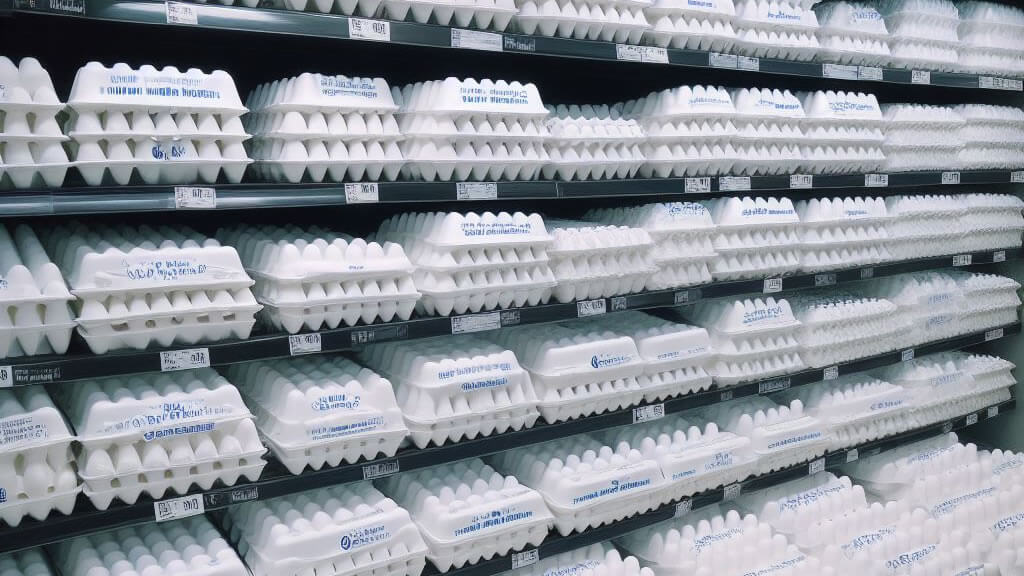The Truth About Foam Egg Carton Recycling
Summary

Have you been rinsing foam egg cartons and tossing them in the recycling bin, feeling good about doing your part? We hate to be the bearers of bad news, but most curbside programs don’t accept foam products like these cartons. They’re made from expanded polystyrene (EPS), a material that’s difficult and costly to process—so cartons are often sorted out and sent to the landfill instead.
Don’t worry—you haven’t been alone in the confusion. Below, we explain what foam egg cartons are, why they’re rarely recycled, what happens if they end up in landfills, and the best ways to keep them out of the trash.
What Are Foam Egg Cartons Made Of?
Foam egg cartons are typically made from expanded polystyrene (EPS) foam—a lightweight, rigid plastic designed primarily for single use.
The Pros and Cons of Foam Egg Cartons
Pros: Foam cartons are very light, cushion eggs well during transport, and are inexpensive to manufacture. In theory, recycling them could conserve resources and reduce landfill waste.
Cons: Most communities do not recycle EPS, and the material is hard to clean and break down. When littered or fragmented, foam can pollute waterways and harm wildlife that mistake small pieces for food.
Are Foam Egg Cartons Recyclable? The Short Answer
Usually, no. Foam egg cartons are typically not accepted in curbside recycling programs.
A Deeper Look: Can Foam Egg Cartons Be Recycled?
While many plastics can be recycled, EPS foam is an exception in most places. It is not biodegradable, and standard recycling centers rarely process it. That said, some specialized drop‑off programs and mail‑back options do exist. Check locally to see whether recycling centers, community organizations, or craft stores accept clean foam egg cartons for recycling or reuse. If no options are available, consider reusing cartons when possible and follow local guidance for proper disposal.
What Happens to Foam Egg Cartons in Landfills?
EPS foam does not biodegrade, so foam egg cartons can persist for decades when landfilled. Over time, they may break into smaller pieces, making cleanup more difficult.
Eco-Friendly Alternatives to Foam Egg Cartons
Instead of foam cartons, try these lower‑impact choices:
- Paper egg cartons: Biodegradable cartons made from recycled paper or molded pulp are a solid alternative. Look for options made from post‑consumer content.
- Reusable egg cartons: Durable plastic or ceramic cartons can be washed and reused for years—reducing waste and saving money over time.
- Returnable egg cartons: Ask local farmers or markets if they offer a carton return and refill program. Returning empties to be refilled keeps packaging in use longer.
- Compostable egg cartons: Some molded‑pulp or plant‑fiber cartons (e.g., bagasse) will compost in home or municipal systems. Verify certifications and local composting rules.
How to Reuse Foam Egg Cartons at Home
Foam egg cartons are versatile and can be handy around the house. Here are a few simple ways to give them a second life:
- Start seedlings. Use the cups as temporary seed starters: poke drainage holes, fill with potting mix, and sow seeds. When seedlings are ready, transplant them into pots or garden beds—do not bury the foam, as it is not biodegradable.
- Organize craft supplies. Sort beads, sequins, ribbons, string, buttons, and more in individual cups for easy access.
- Protect ornaments. Nest delicate ornaments or small baubles in the cups to help prevent breakage during storage.
- Store hardware. Keep nuts, bolts, nails, tacks, and washers neatly separated in a labeled carton.
Reducing Your Environmental Impact With Better Egg Carton Choices
When you can choose the packaging, consider how easily it can be recycled or composted where you live. Foam cartons are rarely accepted in curbside programs and often end up in landfills.
To minimize your footprint, opt for paper‑pulp or recycled‑paper cartons over foam whenever possible. Many communities accept paper cartons in curbside recycling or paper drop‑off. If foam is the only option, reuse cartons as many times as you can before disposal. Some food banks and farmers’ markets also accept clean, intact foam cartons for donation or refill programs.
Every choice adds up. Selecting recyclable or compostable packaging—and reusing when possible—is an easy way to cut waste and help the planet.
Foam Egg Carton Recycling FAQs
Can foam egg cartons be recycled?
Most foam egg cartons are not recyclable in curbside programs because expanded polystyrene (EPS) is difficult to process. However, some communities and retailers offer specialized drop‑off options. Check with your local waste and recycling department. If recycling isn’t available, consider reuse for storage or crafts.
Are foam egg cartons biodegradable?
No. EPS foam is petroleum‑based and does not biodegrade; it can persist for many years in landfills or the environment.
Why are egg cartons not recyclable?
Many curbside programs do not accept foam egg cartons because they are made from EPS, which is challenging to recycle for several reasons:
Low Value
EPS has very low value as a recycled material. It is costly to collect, clean, and densify, yet end‑market demand is limited—making municipal recycling economically difficult.
Where do foam egg cartons go?
In many places, foam egg cartons aren’t recycled and are landfilled. The material is mostly air and the polymers are not easily separated, so many facilities do not process it.
Some retailers or shipping stores may collect foam for specialized recycling, and a few companies convert EPS into items like insulation or packaging. These programs require specific equipment and logistics, so availability is limited and not always cost‑effective for communities.
The most reliable approach is to reuse foam cartons when possible—wash, dry, and use them again for eggs or repurpose them for seed starting, bath toys, or craft storage. Reuse reduces demand for new materials and avoids the energy required for reprocessing.
Are egg cartons recyclable?
Sometimes. Paper cartons are widely accepted and may even be compostable (check local rules). Foam cartons are rarely accepted curbside but might be allowed at specialized drop‑offs. If recycling isn’t available, consider reuse or donation to local vendors who can refill them.
Choosing paper over foam is usually better for the environment because paper is more readily recycled and, in some cases, composted. If foam is unavoidable, focus on reducing use and reusing cartons whenever you can.
Final Thoughts
Foam egg carton recycling is limited, but you still have options: reuse cartons creatively, choose paper packaging when available, and support programs that expand responsible recycling. Small, consistent choices add up—share what you’ve learned and help others make lower‑waste decisions.
 by michael daigle
by michael daigle